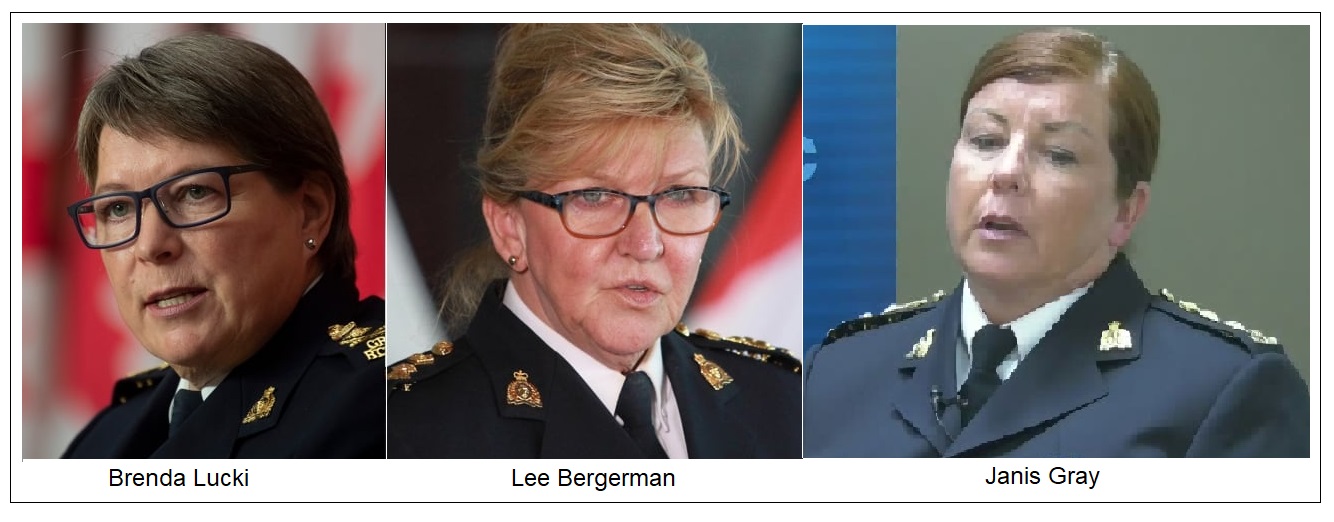True and Fascinating Canadian History
Honouring the RCMP's Sesquicentennial: 1873 - 2023

Division Dysfunctional
And The Murders in Nova Scotia
April 18th and 19th, 2020
RCMP Vets. Ottawa, ON

The RCMP failed Canadians. At no time in Canadian history and the modern era of the Royal Canadian Mounted Police (RCMP) has so much dysfunctionalism been revealed among so many Officers in Nova Scotia some of which preexisted the 22 murders over the April 18th and 19th, 2020 weekend. On TV from the start, there was an obvious lack of unity and cohesion among the Officers.
In the midst of the murders, the Commanding Officer of 'H' Division, Assistant Commissioner Lee Bergerman fell asleep at home. Her absenteeism from her office at Nova Scotia RCMP Headquarters during the entire tragedy was a prime example of active dysfunctionalism, but other cases of unusual behaviour surely existed. Due to Commissioner Brenda Lucki's lack of decisiveness, a climate of negativity and deviance among these Officers in Nova Scotia was allowed to flourish. The untrustworthy Officers, no matter their rank, should have been shuttled out of the province years ago.
For several days after the murders, Chief Superintendent Janis Gray, Officer In Charge of the Halifax District also made herself scarce. There is no public record where she was before, during or after the murders, nor she did make an appearance on TV to explain her role in District policing operations, or explain to the public any strategies she might have put into place overnight so the killer could be contained or captured if he drove into Halifax. Her absence was disappointing and equally striking since she was supposed to be a major leader in the Division. She told everyone so. On the website Linked In, Gray bragged extensively about herself, she wrote, "I have served in four Provinces and am an accomplished police leader" and,..."As a serving police officer, I have extensive experience in leadership." Gray's qualifications should be read with some skepticism since she wrote the remarks herself, but with her outstanding qualifications, one would have expected that she would have played a huge, bigger than life, supportive and morale lifting role to Chief Superintendent Chris Leather and Superintendent Darren Campbell, the two RCMP Officers in the Division who appeared and spoke the most on TV.

Chief Superintendent Chris Leather and Superintendent Darren Campbell were under tremendous stress day after day, and if Gray wanted to prove in public how effective she was as a leader, she could have volunteered to relieve Leather and Campbell occasionally from the glare of TV lights, but she elected not to do so. Gray allowed the full responsibility of the TV briefings to fall on the shoulders of Leather and Campbell, even though she was sitting in a command, operational role at Halifax District and she held the rank of Chief Superintendent. The total absence of Bergerman and Gray only solidified in the minds of TV viewers that there was deep grounded dysfunctionalism and serious fault lines among the Officers in the Division. RCMP Commissioner Brenda Lucki should have taken swift action with these Officers prior to this sort of dysfunctionalism ever getting out of hand.

The Mass Casualty Commission (MCC) hearings in Halifax brought to light signs of indiscretion, poor judgment and stupidity by other Officers which only made Canadians disappointed, sick and disheartened. It became evident that some Officers were in over their heads. Their lack of knowledge, and avoidance of involving themselves in the largest criminal case of its kind in Canada were a direct reflection of the ill qualified management style of RCMP Commissioner Brenda Lucki. In direct testimony before the MCC, she admitted on camera that Canadians, most especially Nova Scotians, lost faith in the RCMP. The Commissioner's declaration of total failure by the "H" Division Officers was no surprise but it was a first.
Chief Superintendent John Robin, another senior RCMP Officer of questionable character, was identified in the press as the spouse of Chief Superintendent Janis Gray. He turned out to be a significant disappointment. As Canadians would eventually learn, Robin improperly aligned himself to the Mass Casualty Commission, and this indiscretion did nothing to enhance the respectability or the trust of the RCMP in Nova Scotia.
John Robin was assigned by Assistant Commissioner Lee Bergerman to lead a small team of RCMP members to gather evidence for the Mass Casualty Commission (MCC) looking into the mass murders. Apparently all he had to do was photocopy a few administration and operational files and walk the dossiers over to the Mass Casualty Commission based in Halifax. Robin was employed solely by the RCMP, and at no time was he working for the MCC. However, he had personalized RCMP business cards printed which linked his work to the MCC, and his card identity left witnesses with the false impression that his role came under the authority of the MCC. Of course, he had absolutely no association to the MCC, and the business cards were fake.

Speaking to Saltwire journalist Chris Lambie about John Robin's business card misrepresentation, one witness from Onslow, NS said she was, "...questioning why a senior Mountie in plain clothes visited her last month, handing out an RCMP business card that says Nova Scotia Mass Casualty Commission. RCMP Chief Superintendent John Robin and a woman who was also dressed in plain clothes visited Sharon McLellan and her husband Tim on April 12. “I don’t even know who this man was, to be honest. I allowed him into my house. But apparently, he’s not who he was supposed to be,” McLellan said Wednesday. She was left with the impression that Robin was with the Mass Casualty Commission. That’s what his card said. She concluded, "I have no idea who to trust anymore.” (Lambie: 2021). The McLellans were deeply and emotionally affected by John Robin's deceitful business card caper, and sadly it will be recalled by Nova Scotians for a long, long time.
After Robin's scheme was uncovered, lawyers for the MCC blew up and it caused them to go into recovery mode. The Inquiry made every effort to distance themselves from Robin and the RCMP. MCC lawyers made it categorically clear in the press that Robin was not in any way associated with the public hearings, nor was he on the MCC payroll. But, by the time the MCC discovered Robins' deceitful conduct it was too late. The harm was done. Assistant Commissioner Bergerman was already working under a dark cloud for her absenteeism during the crisis, and her decision to choose Robin for a simple job that any summer student could likely do was ruled irresponsible. Bergerman and Robin were both senior Officers within the Division, yet the pair were irresponsible. They did not foresee any perceived conflict of interest if Robin was allowed to handle sensitive files which might identify his wife. Bergerman's decision to assign Robin came under more intense scrutiny, and her blunders kept piling up.

Robin's business card caper was embedded with deceit, and it was viewed by the MCC as sneaky. Lawyers concluded that Robin could not be fully trusted. He was married to RCMP Janis Gray, and MCC lawyers feared that Robin's cozy marital relationship would affect his judgment, and that he might attempt to clean and tidy any RCMP documents in which his wife was mentioned. The MCC was nervous that they would not be provided the real truth, but instead Robin would give them sanitized versions of whatever documents he chose to hand over. The whole mess blew up in the press. Legal analyst Mr Wayne MacKay, emeritus professor of law at Dalhousie University in Halifax, said, "The RCMP should be mindful about any appearance of bias and how that could impact public trust in the force, including its co-operation with the independent inquiry." (McMillan: 2022). Robin was handed a simple task by the CO, but considering the fallout and the way that his misconduct affected the MCC and witnesses, he too was in over his head. Robin was swiftly yanked off the entire assignment and the job was handed to a more responsible Officer in the Division. Press briefings by the MCC noted how trust in the RCMP had already been eroded in Nova Scotia, and the John Robin business card episode did nothing to improve the Force's overall reputation.
The blunder by Chief Superintendent Robin only pales to the disgraceful case of another Officer in the Division who declared absenteeism in the face of the largest murder investigation in Canadian history. RCMP Superintendent Archie Thompson was the Officer in Charge of the Northeast district in Nova Scotia. The murders occured within his sphere of responsibility. He demonstrated how undependable he was.

The best of police experts cannot adequately explain Thompson's dysfunctionalism. He was a police officer, but his unreliability was beyond words. He testified that he stayed home during the mass shooting crisis apparently to avoid command confusion, and because he wore a white shirt. He didn't think to grab his pistol and load it, rush out of his house, to drive towards Portapique to aid and provide direction to his subordinate NCOs and constables, or to wear a jacket to cover his shirt. Journalist Michael Tutton in The Globe and Mail reported that, "Mr. Thompson said his notes indicated that at 9:52 a.m. on April 19, 2020 Staff Sgt. Halliday sent him a message saying “shots fired,” and then he [Halliday] was unable to provide a further update as he was busy." It is an absolute mystery that after being told about shots being fired, Thompson didn't budge from his easy chair. He had been told that the community was under threat, and his decision to stay at home is so incomprehensible for police officers that it must top Assistant Commissioner Bergerman's unreliability
Thompson said, "that more than an hour later, at 10:57 a.m., Staff Sgt. Halliday sent another message saying, “We have major issues,” and telephoned his commander 15 minutes later to relay information about additional deaths. However, Mr. Thompson said being present at the command post where Staff Sgt. Halliday was assisting Staff Sgt. Jeff West, the critical incident commander, wouldn’t have helped. I wouldn’t want to do that and inject myself into the investigation .... The rank, the colour of the uniform tends to have an impact when I show up,” Thompson said. His reasoning was hollow.
Staff Sergeant Halliday gave Superintendent Thompson sufficient warnings that trouble was brewing within his police jurisdiction. His reasons not to jump into his car and speed to the scene are weak and unforgiving. At that particular time in Portapique and at the crime scenes, his subordinate constables and NCOs were in a state of utter chaos and disbelief. They were afraid of being shot. House fires, and bodies of the deceased scattered the property. It was Thompson's responsibility to take charge, assist the victims as best he could and give direction to his subordinates. He was unfaithful to these needs.

More than any other Officer posted to Nova Scotia in 2020, Thompson demonstrated that he was in over his head by far. The responsibilities of policing at the Officer level proved too much for him. On the professional website Linked In, Thompson wrote the following about his leadership qualifications having, "A history of consulting with partners to identify priorities and putting in place initiatives which are measurable and which produce positive results. A proven leader in responses to civil and criminal emergency situations with a demonstrated ability to work with partners towards ensuring public safety." In contrast to his bluster, Thompson's conduct at a time of crisis was fully disappointing by any measurement. Instead of taking full and decisive command of the entire police operation on the ground, he elected to stay home and allow other police officers including Staff Sgt. Halliday to bake and boil under the stress of multiple tasks. In the time of crisis, all police officers are on deck -- there are no exceptions most especially for a Superintendent. Since 1873, that rule has never changed. It has always been that way.
In a review of my 60 year relationship with the RCMP, I cannot think of any other police officer who failed his subordinates so poorly as did Thompson. In the time of an emergency, using the phone from home as Thompson did was not the same as a police officer actively providing advice to one's subordinates and helping out as best one can in the fray. Stupidity and the absolute failure to help friends in need are not attributes that anyone admires. One more mistake can be attributed to Commanding Officer Bergerman. Thompson failed everyone. He should have been demoted to Sub Constable then fired before he was allowed to retire from the RCMP.
A few senior RCMP Officers failed Canadians. But, it is not fair to lump every Officer in Nova Scotia together. Without question, the RCMP has many fine, strong, progressive and decisive Officers, but their presence was not expected in Nova Scotia over that terrible, sad April weekend in 2020. The Officers assigned to Nova Scotia in April, 2020 should have been able to handle the investigation if they had only all pulled together. The killer might have escaped them for a while, but a team effort by everyone would have demonstrated to Nova Scotians that the RCMP was doing its very best. A strong commitment by everyone in the Division was all the RCMP had to do. That's all Nova Scotians expected.
Dysfunctionalism within an organization usually begins at the top. In the Nova Scotia case, the selection of Assistant Commissioner Bergerman by Commissioner Brenda Lucki to lead the Division proved to be a very, very poor choice, and every decision which she made after her appointment to CO only magnified her professional weaknesses. She did not study the strengths and weaknesses of her Officers especially Chief Superintendent John Robins and Superintendent Archie Thompson. Bergerman should have known John Robins' limitations, and not assigned a task to him that was too complex. He blotched a simple job, and according to press reports, he proved to be a detriment to the Division. Due to his business card blunder, the RCMP lost credibility in the eyes of the public, the legal community and the Mass Casualty Commission.

Superintendent Archie Thompson failed to respond in the face of a major and deadly crisis. He failed in the eyes of everyone; the survivors, his subordinates, the community, and the RCMP. He was promoted to the Officer level which turned out to be far beyond his capability to think, act, respond and reason as a police officer.
In 2023, the Force is eligible to celebrate its 150th Anniversary, but there will be no cup cakes served or candles lit by Nova Scotians for the upcoming RCMP festival. If the RCMP wants to survive, the Officers chosen today must first regain the public's trust, and they must be honest for otherwise stagnation and dysfunctionalism will set in again as was the case in Nova Scotia. Today's RCMP Officers are expected to do far better, and they must.
Reporting from Fort Healy,
J. J. Healy
September 9, 2022
Lambie, Chris. (2021). 'I have no idea who to trust anymore': card raises independence questions about Nova Scotia's Mass Casualty Commission. Saltwire. May 6, 2021.
MacMillan, Elizabeth. (2021). RCMP reviews hiring of 2 staffers helping prepare for mass shooting inquiry
Tutton, Michael. (2022). Senior RCMP officer told inquiry he stayed home during N.S. mass shooting to avoid command confusion. The Globe and Mail. July 22, 2022.







